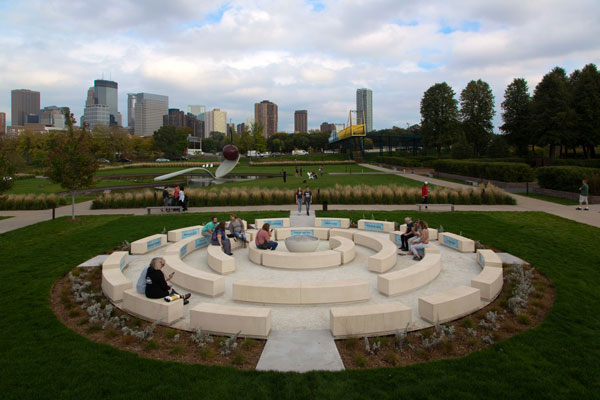
An art installation created by Angela Two Stars, Okciyapi, 2021, in the Minneapolis Sculpture Garden. The cast concrete sculpture incorporates Dakota language engravings, enamel on steel, bound aggregate with embedded luminescent pebbles, native plantings, and Dakota audio recordings. The Walker Art Center commissioned the work with funds from the T. B. Walker Acquisition Fund, the Friends of the Falls, and Russell Cowles. Photography: Andy Underwood-Bultmann, courtesy of the Walker Art Center, Minneapolis, Minnesota
By weaving together scholarly discussions, artistic insights, and visual and literary depictions, this panel aims to illuminate the complex interplay between historical traumas, artistic representation, and the ways in which some artists used their work to express an enduring spirit of resilience and resistance. The presenters will address the power of art as a lens through which to explore and understand the resilience of individuals and communities facing systemic violence and persecution.
Sarah Phillips Casteel and Elizabeth Otto will explore how art created during and after the Holocaust created agency and voice for those the Nazis targeted for persecution and murder. Angela Two Stars will discuss how the memorials to thousands of abducted and murdered Indigenous women, girls, and their families used art to raise awareness about this ongoing epidemic. Finally, Francisco Souto’s work combines techniques from the past and materials from the current moment to create art that acts as witness to the present. Together, these speakers will illuminate the ways in which art and literature provide an aesthetic language to navigate the fine line between commemoration, education, and the ethical representations of trauma.
Panelists
Sarah Phillips Casteel, Professor, Department of English Language and Literature, Carleton University
Elizabeth Otto, Professor of Modern and Contemporary Art History, University at Buffalo
Francisco Souto, Director, School of Art, Art History & Design, University of Nebraska–Lincoln
Angela Two Stars, Multidisciplinary visual artist, public artist, curator, and the Great Plains Art Museum’s 2024 Elizabeth Rubendall Artist in Residence
Moderator
Angel M. Hinzo, Assistant Professor of History and Ethnic Studies, University of Nebraska–Lincoln
This virtual or in-person discussion is free and open to the public. Registration is required to receive the link to watch virtually.
For more information, contact Kierra Crago-Schneider at kcrago-schneider@ushmm.org.
Joseph and Rebecca Meyerhoff of Baltimore, Maryland, were active philanthropists in the United States and abroad, focusing especially on Jewish learning and scholarship, music, the arts, and humanitarian causes. Their children, Eleanor Katz and Harvey M. Meyerhoff, member and chairman emeritus of the United States Holocaust Memorial Council, have endowed this lecture.
The mission of the Jack, Joseph and Morton Mandel Center, part of the United States Holocaust Memorial Museum, is to ensure the long-term growth and vitality of Holocaust Studies. To do that, it is essential to provide opportunities for new generations of scholars. The vitality and the integrity of Holocaust Studies require openness, independence, and free inquiry, so that new ideas are generated and tested through peer review and public debate. The opinions of scholars expressed before, during, or after their activities with the Mandel Center do not represent and are not endorsed by the Mandel Center or the Museum.
